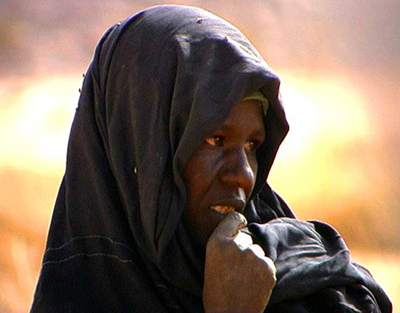

 |
 |
|
The Tuareg are known as the "Blue Men of the Sahara", so-called for the deep indigo dyes they often use in their robes. The men are veiled but the women are not, unlike in most Muslim groups. Their social organization, based on a matrilineal system, gives an important role to the women.
These nomadic desert people are known best for the indigo turbans worn by the men. The turbans conceal their identity as well as protect them from the fierce desert winds. Usually given around the ages of 15 to 20, the turban is a sign of manhood and means that a man is now able to take a wife and lead a camel caravan. Boys prepare to lead such a caravan their entire lives by learning about the star constellations. Each village is named after a star and is located underneath it. The stars are a natural map for the camel caravans roaming across the open desert at night. Night travel also combats the daytime heath of the Sahara. Their society was matriarchal, their women independent and full of fire. Nobility passed through the mother’s line, not the father’s. A woman is considered a noble and rules her home; women own all of the livestock and moveable property. Men also prefer for their wives not to do any hard labor, so her hands remain beautiful. Servants pound the millet, wash clothes and prepare meals. Nowadays, TUAREG is not a term to define one individual ethnic group. It means those people who speaks a dialect of the Berber language, TAMASHEK (or TAMAHAK, or TAMAJAK). Accordingly in the group called Tuareg, we must not forget that black people too are contained in addition to Berber. |
|---|
| Their culture was feudalistic, with nobles, vassals, and slaves. They shunned modern weapons of war, preferring the honor of individual combat with sword, dagger, and shield. They have always been shrouded in mystery and myth, feared by all who entered their lands. They were a race of poets and romantics, who ruled with a harsh desert code of honor. For centuries the nomadic Tuareg were the undisputed kings of the desert, the lords of the great caravan routes along which flowed salt, slaves, and gold. For a Tuareg, the desert is freedom. "To be locked up in a house is certain death. They need to see the stars—living under the stars is freedom.” Their present existence is of poverty and drought, their heritage lost dreams. But if their women are still strong and their men still proud, if they are still a race of poets and romantics, they now cast but a small shadow of their former magnificence. Yet they remain unbowed, among the more noble and spirited people of the earth. |
||||
|---|---|---|---|---|
| Our encounters with the Tuareg people were scarse and often accidentally, but never something to forget. They met the ethnographic side of CAM 3001 with a strong impact by their way of living, thinking and feeling. There is certainly some difference in language and culture, but due to a mutual understanding this was not important at all. The camera worked always as a soft approach, perhaps as some intrusion in their life, but mainly as some type of communication by different means. They reacted often positively to this form of narrative attention for their lifestyle, rewarding the documentation work with some of their estimation. |
||||
|---|---|---|---|---|
|
|
|
||
|
Trailer "Sahara"
|
Slide Show "Turban"
|
||
|---|---|---|---|
|
|
|||
|
(coming soon) |
|
 |
 |